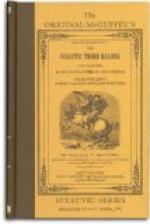2. She smiled, and said, “You, Fred, you wash dishes?” “Yes, indeed, mother,” replied Fred; “I should be a poor scholar if I couldn’t, when I’ve seen you do it so many times. Just try me.”
3. A look of relief came over his mother’s face as she seated herself in her low rocking-chair. Fred washed the dishes, and put them in the closet. He then swept the kitchen, brought up the potatoes from the cellar for the dinner and washed them, and then set out for school.
4. Fred’s father was away from home, and as there was some cold meat in the pantry, Mrs. Liscom found it an easy task to prepare dinner. Fred hurried home from school, set the table, and again washed the dishes.
5. He kept on in this way for two or three days, till his mother was able to resume her usual work, and he felt amply rewarded when the doctor, who happened in one day, said, “Well, madam, it’s my opinion that you would have been very sick if you had not kept quiet.”
6. The doctor did not know how the “quiet” had been secured, nor how the boy’s heart bounded at his words. Fred had given up a great deal of what boys hold dear, for the purpose of helping his mother, coasting and skating being just at this time in perfection.
7. Besides this, his temper and his patience had been severely tried. He had been in the habit of going early to school, and staying to play after it was dismissed.
8. The boys missed him, and their curiosity was excited when he would give no other reason for not coming to school earlier, or staying after school, than that he was a “wanted at home.” “I’ll tell you,” said Tom Barton, “I’ll find him out, boys—see if I don’t!”
9. So he called for Fred to go to school, and on his way to the side door walked lightly and somewhat nearer the kitchen window than was absolutely needful. Looking in, he saw Fred standing at the table with a dishcloth in his hand.
10. Of course he reported this at school, and various were the greetings poor Fred received at recess. “Well, you’re a brave one to stay at home washing dishes.” “Girl boy!” “Pretty Bessie!” “Lost your apron, have n’t you, Polly!”
11. Fred was not wanting either in spirit or courage, and he was strongly tempted to resent these insults and to fight some of his tormentors. But his consciousness of right and his love for his mother helped him.
12. While he was struggling for self mastery, his teacher appeared at the door of the schoolhouse. Fred caught his eye, and it seemed to look, if it did not say, “Don’t give up! Be really brave!” He knew the teacher had heard the insulting taunts of his thoughtless schoolmates.
13. The boys received notice during the day that Fred must not be taunted or teased in any manner. They knew that the teacher meant what he said; and so the brave little boy had no farther trouble.
Definitions.—1. Lan’guid-ly, feebly. 5. Am’ply, fully. O-pin’ion, judgment, belief. 9. Ab’so-lute-ly, wholly, entirely. 11. Re-sent’, to consider as an injury. Con’scious-ness, inward feeling, knowledge of what passes in one’s own mind.




